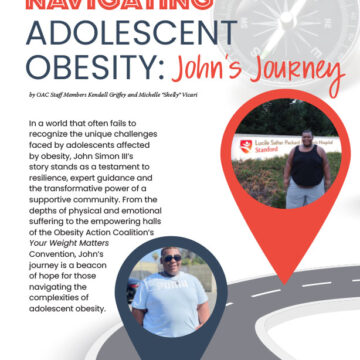Dealing with Spousal Support and Sabotage


by Leslie M. Golden, MD, MPH, ABOM Diplomate
Winter 2024
The journey to overcoming obesity is a significant one, and having a strong support system can make a world of difference. We often hope that our friends, family, and especially our life partners, will stand by us as allies. But what if they don’t? It can be challenging when those closest to us don’t fully support our weight-loss efforts. In this article, we will explore the challenge of getting support from our loved ones, why it might not always happen, and most importantly, how we can overcome these obstacles to succeed in both our health goals and relationships.
Understanding Spousal Sabotage
Spousal sabotage happens when our partners, knowingly or unknowingly, hinder our progress toward a healthier weight. The reasons for their actions may not always be clear, but they can create roadblocks to our success. Here are some examples you might recognize:
Isolating from shared activities:
“We can’t go to the tailgate because you’re watching your diet.”
Encouraging off-plan eating:
“ You’ve been good; you deserve dessert tonight.”
Using affection to discourage change:
“I love you as you are. Why do you need to change?”
Stocking tempting treats at home:
“I bought Halloween candy just for you!”
Reminding of past failed attempts:
“Which diet are you trying this time?”
Acting offended when you decline their food:
“ You’re too good for my lasagna now.”
If you’ve experienced situations like these, you know how they can throw you off track or make you feel distant from your partner. It’s crucial to consider that your partner’s actions might not be intentional; they might not realize their behaviors are unsupportive. These actions could be rooted in their own insecurities, such as a fear of change, a history of using food as a gesture of love, or a genuine belief that they are helping us.
Building New Rituals Together
Our relationships are built upon the bonds we share, often revolving around rituals or traditions that define our connections, like a pizza date, a daily dessert, or a nightly glass of wine. As you choose to make changes to improve your health, some of the activities you once enjoyed with your partner may no longer align with your health journey.
While you may be ready for these changes, your partner might not be as prepared to embrace them. They might feel like they’re being pulled along, causing a significant shift in your relationship dynamic. To strengthen your connection, it’s helpful to involve your partner more in the change process. The key is to discover new experiences and rituals together, emphasizing that your connection is not solely built on past habits. Here are a few ideas to consider:
- Change takeout night to learning to cook a new recipe at home together.
- Replace dessert routines with sharing a cup of hot tea together.
- Instead of unpacking your day over a glass of wine, go for a walk together.
- Replace a TV night with reading and discussing the latest bestseller.
Navigating Insecurities and Jealousy
You might find that your partner struggles with feelings of insecurity or jealousy as you embark on a weight-loss journey. If this happens, it’s important to give them time and space to adjust. Allow them the opportunity to share their fears and anxieties, and if needed, seek support from other sources. Setting boundaries and leading by example can also be effective strategies.
As your loved ones witness the positive changes in your health, there’s a possibility that they may become more open to making their own positive health changes. If this shift occurs, be there to support them on their own journey.
Providing a Clear Plan
When discussing your weight-loss journey, it’s crucial to communicate your goals and intentions clearly. Help your loved ones understand the vision you have for becoming the healthiest version of yourself. Many people naturally harbor apprehensions about change and the uncertainty it can bring. As you embark on your new goals, concerns might arise as your loved ones and friends grapple with the potential implications for the rituals and celebrations that mark your time together.
If this happens, you can assure them that your journey is unique to you and does not necessarily mean significant changes for everyone. By outlining your goals and intentions, you can help alleviate some of their worries and show them where your journey is headed. This transparency can help put everyone at ease as they come to realize that your personal goals don’t necessarily entail radical transformations for the entire family or friendship.
Impact on Your Success
Regardless of the reason for their behavior, it can have a significant negative impact on your success. Recognizing that obesity is a chronic, recurring condition, the support and understanding of a partner can significantly influence your ability to navigate the challenges that will inevitably arise. While our partners often want to help, they may require guidance on how to do so effectively. Your ability to recognize damaging behaviors allows you both the chance to address these issues with your partner before they negatively impact your health and your relationship.
Honest Reflection
When things get tough, you might want to blame someone else. You might think, “If they would just support me, everything would be easier.” However, it’s important to take a moment to decide if this belief is genuinely true and fair. Ultimately, your partner cannot force you to do anything; you always have a choice.
When they bring your favorite treat home or encourage you to take the night off from your plan, you are not forced to accept their offer. While it may make things more challenging, viewing it as an opportunity to reinforce your boundaries and help them learn what support means for you can be beneficial.
Taking care of yourself means doing what is best for you, even when it’s hard. If your partner doesn’t fully support the changes you want to make, it’s not easy, but it’s not impossible. The first step is realizing that you are making these changes because you want to, not because someone else is making you. This realization alone can help you improve your relationship and your health journey. Remember, your partner should not have to change just because you do.
Communication is Key
Always remember open and honest communication is vital. Set aside a designated time to sit down with your partner and share your feelings and concerns. Emphasize why your health matters to you, using “I” statements to avoid triggering defensiveness. Be prepared to explain how they can support you effectively. This approach fosters empathy and understanding.
An important part of this process is spending time considering how you need to be supported so that you can communicate your needs effectively. We don’t come with manuals, after all.
Seeking Professional Help
If communication and efforts to adapt with your partner continue to be challenging, you can try seeking professional assistance, such as a marriage or relationship counselor. A skilled counselor can provide a neutral space for both partners to express concerns, offer insights, and suggest strategies to enhance understanding and collaboration.
Overcoming Challenges Together
Spousal sabotage can be overcome with patience, communication and, if needed, professional help. Your health journey is important, and with the right support, overcoming challenges and achieving success is possible.
About the Author:
Leslie Golden MD, MPH, is board-certified in Family Medicine and Obesity Medicine. With a deep passion for increasing awareness and understanding of obesity as a disease, she leverages both her medical expertise and personal weight journey to help patients improve their health. Dr. Golden practices at her private practice, Weight In Gold Wellness, located in Wisconsin.
by Robyn Pashby, PhD Winter 2024 “No one is ever going to date you if you don’t…
Read Articleby Michelle “Shelly” Vicari Winter 2024 Winter has arrived! Don’t allow the chilly and damp weather to…
Read Articleby Kendall Griffey, OAC Communications Coordinator Winter 2024 The Obesity Action Coalition’s 12th annual Your Weight Matters…
Read Article









